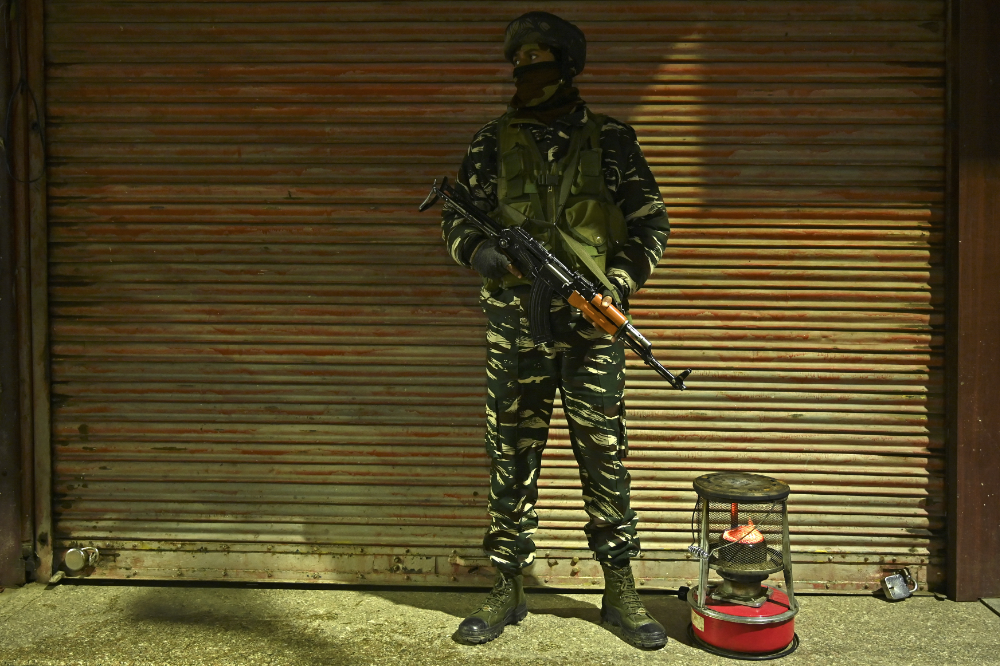The dispute over Jammu and Kashmir is one of the longest-standing issues on the agendas of the UN and the Organization of Islamic Cooperation (OIC).
The root cause of three wars and countless skirmishes between Pakistan and India, it is a singularly significant territorial dispute between two densely populated neighbors in a volatile region with nuclear overhang.
At its core, it is a human rights issue, emanating from India’s obstinate denial of the Kashmiri people’s inalienable right to self-determination.
The continuing Indian occupation of the disputed territory constitutes a violation of international law, as a number of UN Security Council Resolutions — including 47 and 91 — unambiguously stipulate that the future of the disputed state of Jammu and Kashmir shall be decided through “the democratic method of a free and impartial plebiscite.” In other words, the people who live there should decide.
India has a long history of employing fascist tactics to suppress the genuine aspirations of Kashmiris. Its draconian actions have been particularly alarming since Aug. 5, 2019, when the Indian government removed Jammu and Kashmir’s special status, without the consent of the Kashmiri people.
This brought the area directly under the control of the central government and divided the territory into two parts. These actions were clearly aimed at changing the demographic composition of the region, further suppressing the Kashmiri people, and depriving them of their distinct identity and the right to self-determination.
India has triggered a process designed to transform Kashmiri Muslims into a dispossessed and disenfranchised minority in their homeland. The issuance of domicile certificates to non-Kashmiris from across India, and allowing outsiders to buy Kashmiri land constitute the two most alarming features of this process. These actions are illegal and in flagrant violation of UN Security Council resolutions and international law, including the Fourth Geneva Convention and Security Council Resolution 122.
By deploying hundreds of thousands of security personnel in the region, the current Indian leadership remains bent on perpetuating its illegal occupation of Jammu and Kashmir. The religious-supremacist doctrine of the ruling Bharatiya Janata Party-Rashtriya Swayamsevak Sangh (RSS) regime in India, termed the “Hindutva,” aims to wage a civilizational war against Islam and other faiths, and subjugate minorities. Kashmiri Muslims remain the primary victims of this mindset.
Over the past 18 months, the Kashmiri people have endured enormous suffering as a result of a military siege, communications blackouts and slowdowns, arbitrary detentions, and other unprecedented restrictions.
The Indian occupation forces have persistently violated every fundamental right of the Kashmiri people and employed every tool of oppression to further consolidate their illegal stranglehold. There have been repeated instances of extrajudicial killings during fake “encounters,” “cordon-and-search” operations, the destruction of property, and the indiscriminate use of pellet guns and live ammunition against unarmed, peaceful protesters.
To prevent the world from discovering the grave reality unfolding in Indian Illegally Occupied Jammu and Kashmir (IIOJ&K), the occupation forces intimidate Kashmiri journalists. Kashmiri political leaders and activists face protracted, indefinite detentions.
India’s actions in IIOJ&K manifestly violate various international instruments on human rights, including the Universal Declaration of Human Rights, the International Covenant on Civil and Political Rights, and the International Covenant on Economic, Social and Cultural Rights.
Alongside other forums, the Office of UN High Commissioner for Human Rights recorded many of these violations in its reports of June 2018 and July 2019. Instead of showing any improvement, however, the human rights situation on ground has further deteriorated.
In fact, Indian designs for Jammu and Kashmir replicate Israeli settlement plans in the West Bank. The activities of Israel and India — in Palestine and Kashmir, respectively — are essentially the same, with particular reference to egregious human-rights violations and blatantly illegal attempts to change demographics.
The issues in Kashmir and Palestine, which are both rooted in a colonial past, have persisted as unresolved issues on the global agenda for more than 70 years: The first Security Council resolution on Kashmir was adopted in January 1948, and the first on Palestine in March of the same year.
From the standpoint of international law, and based on the UN Charter, the issues of Kashmir and Palestine are both entrenched in the right to self-determination. Both situations are worsening and demand the urgent attention of the international community to reach peaceful resolutions in accordance with the relevant UN resolutions and the aspirations of the peoples who live there.
This attention must not be confined to legitimizing the status quo. Illegal and whimsical solutions that are unilaterally imposed by power politics will not be durable. Only a just and rules-based international system can be expected to underwrite durable peace and stability, in the regional and global contexts.
UN Security Council Resolution 2334 clearly defines Israeli settlements in the occupied Palestinian territories to be “a flagrant violation under international law” and a major obstacle to achieving a “just, lasting and comprehensive peace.” We are in dire need of a similar admonishment of India’s activities in Kashmir.
In meeting its commitments to the 14 million Kashmiri people, the international community must urge India not to act in defiance of its obligations under international law but to fulfill those obligations; to rescind its unilateral and illegal actions since Aug. 5 2019; to implement the relevant Security Council resolutions that call for a UN-supervised public vote on the future of the region; to halt its blatant violations of human rights; and to provide unhindered access to the UN, the OIC, human rights organizations and the international media so that they can investigate, assess and report on the situation in IIOJ&K.
The world must take resolute action to promote and protect the right to self-determination of the Kashmiri people.
• Ambassador Rizwan Saeed Sheikh is Pakistan’s permanent representative to the Jeddah-based Organization of Islamic Cooperation (OIC).











